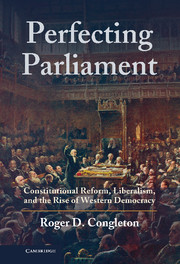Appendix - Methodological Approach, Limits, and Extensions
Published online by Cambridge University Press: 05 June 2012
Summary
Perfecting Parliament surveys a good deal of history and reflects many years spent reading constitutional documents, political treatises, and hundreds of books and papers written by careful historians. However, Perfecting Parliament is not intended to be mainly a historical work, but rather a contribution to social science. The book attempts to develop and test a particular theory of constitutional design and reform, rather than to induce patterns from past experience. This is not because induction is logically impossible or without interest. Indeed, my recognition of the importance of the king-and-council template was a consequence of research on Swedish constitutional history (Congleton 2001b, 2003c). Rather, it is because the main goal of this book is to advance constitutional theory.
The book develops a general theory of rule-based governance and reform. It uses that model to explain the emergence and properties of king-and-council-based systems of governance and peaceful transitions from authoritarian regimes to constitutional democracies. The case studies, historical overviews, and statistical analysis are undertaken to assess the explanatory power of that analytical approach to history. The evidence developed in Part II and in Chapter Nineteen suggest that relatively simple rational-choice models can shed significant light on important episodes of Western constitutional history.
- Type
- Chapter
- Information
- Perfecting ParliamentConstitutional Reform, Liberalism, and the Rise of Western Democracy, pp. 611 - 626Publisher: Cambridge University PressPrint publication year: 2010



